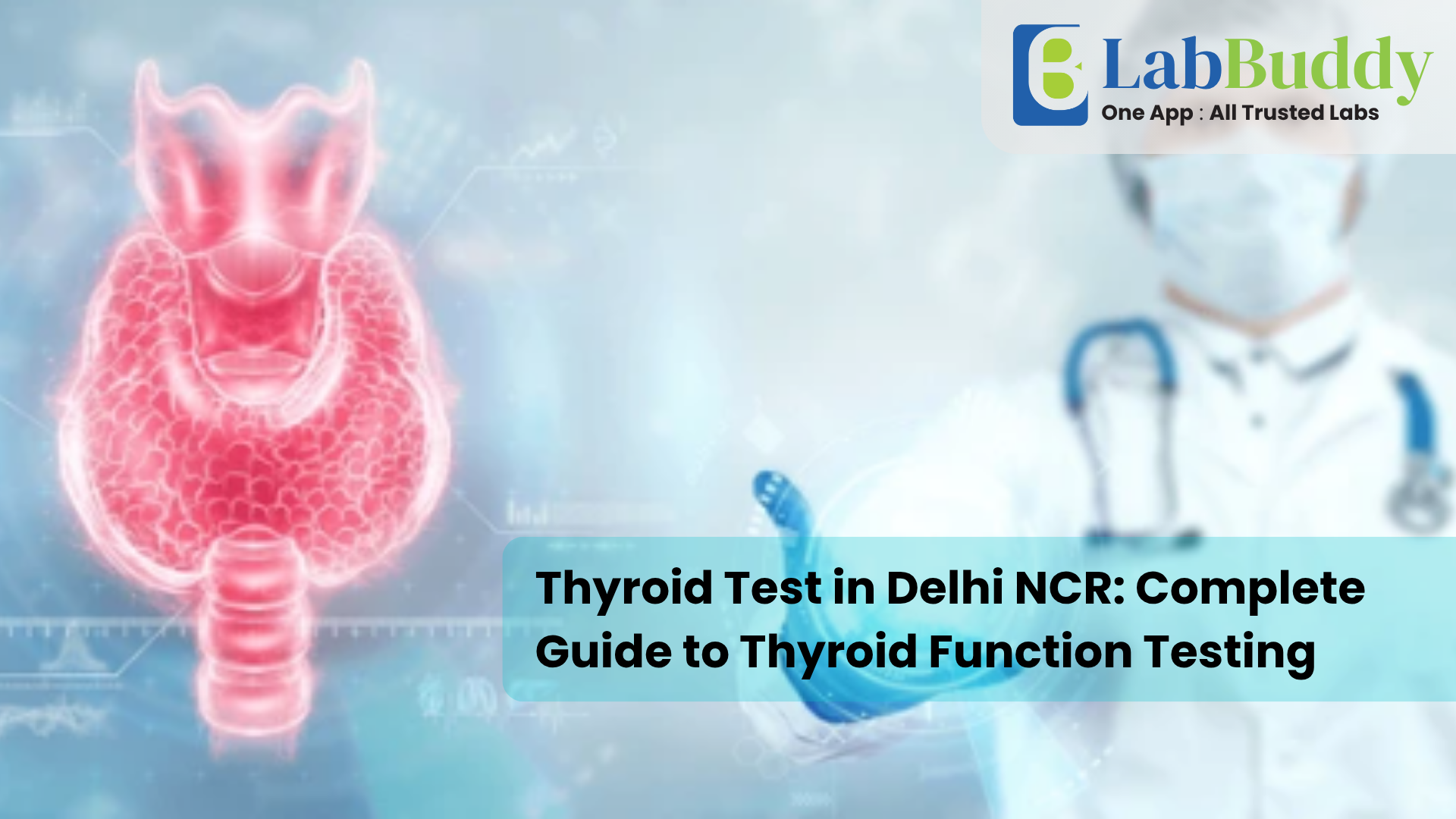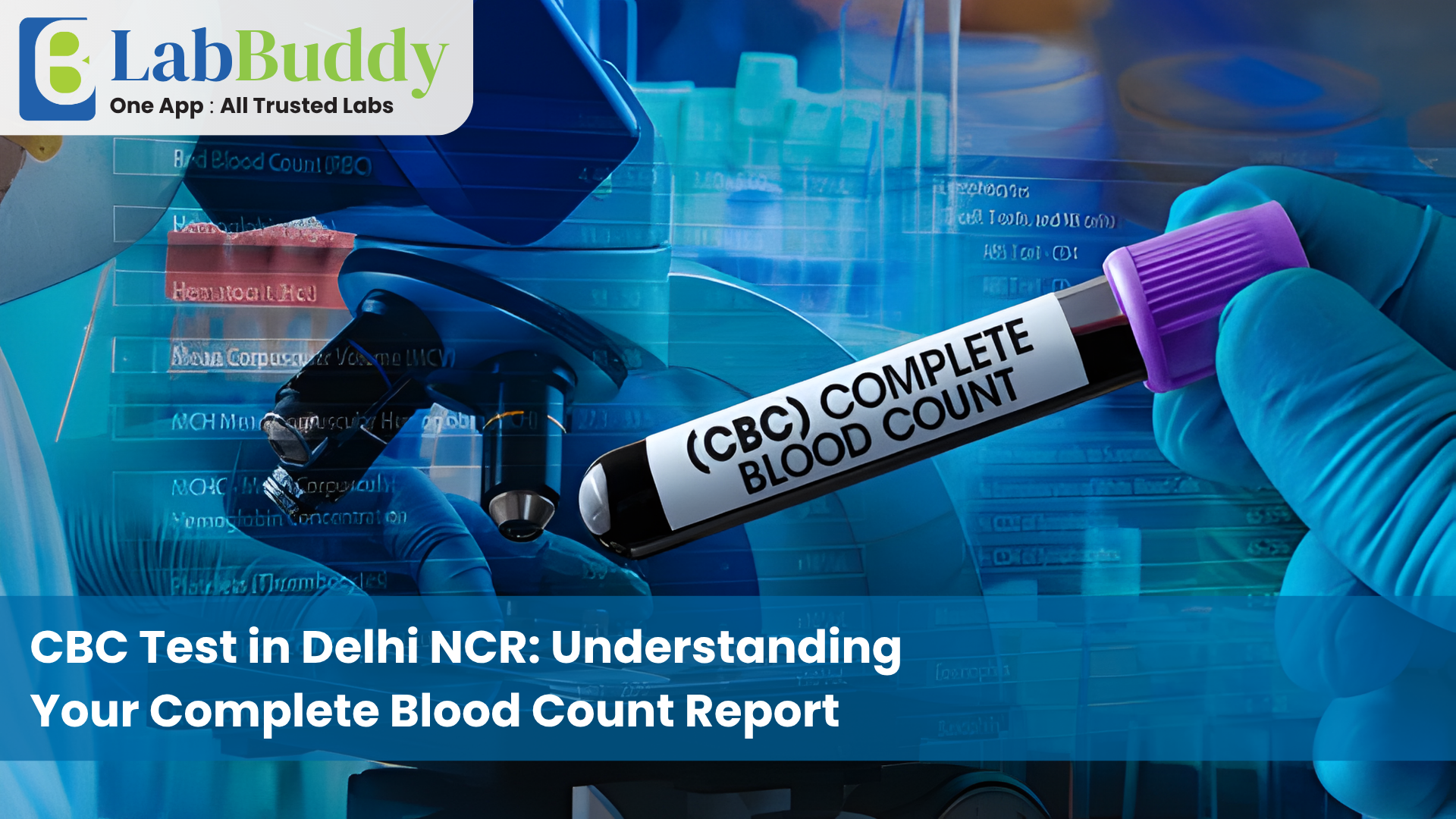Thyroid Test in Delhi NCR: Complete Guide to Thyroid Function Testing
Understanding Thyroid Function in Urban India

The thyroid gland plays a crucial role in regulating metabolism, energy production, and numerous body functions. In Delhi NCR's high-stress, pollution-laden environment, thyroid health has become increasingly important.
Thyroid Challenges in Delhi NCR:
High stress levels affecting hormonal balance
Environmental pollution impacting endocrine function
Sedentary lifestyle and irregular eating habits
Increasing prevalence of thyroid disorders
Limited awareness about thyroid health
What is the Thyroid Gland?
The thyroid is a butterfly-shaped gland located in the neck that produces hormones controlling:
Metabolism
Energy production
Body temperature
Weight management
Nervous system function
Reproductive health
Common Thyroid Tests
1. TSH (Thyroid Stimulating Hormone) Test
The primary screening test for thyroid function, measuring how well your thyroid is working.
Normal Range: 0.4-4.0 mIU/L
Significance:
Detects hypothyroidism and hyperthyroidism
First indicator of thyroid dysfunction
Helps determine need for further testing
2. Free T4 (Thyroxine) Test
Measures the active thyroid hormone circulating in your blood.
Normal Range: 0.82-1.77 ng/dL
What It Reveals:
Thyroid hormone production levels
Confirms TSH test results
Helps diagnose specific thyroid conditions
3. Free T3 (Triiodothyronine) Test
Measures the most active thyroid hormone.
Normal Range: 2.0-4.4 pg/mL
Importance:
Indicates how effectively thyroid hormones are working
Helps diagnose hyperthyroidism
Provides comprehensive thyroid function assessment
4. Anti-TPO Antibodies Test
Detects autoimmune thyroid conditions.
Normal Range: Less than 35 IU/mL
Significance:
Identifies autoimmune thyroid disorders
Helps diagnose Hashimoto's thyroiditis
Indicates potential future thyroid problems
Thyroid Disorders Common in Delhi NCR

Hypothyroidism
Condition where thyroid doesn't produce enough hormones.
Symptoms:
Unexplained weight gain
Fatigue and weakness
Cold intolerance
Dry skin and hair
Depression
Constipation
Memory problems
Risk Factors in Delhi NCR:
Chronic stress
Pollution exposure
Sedentary lifestyle
Nutritional deficiencies
Genetic predisposition
Hyperthyroidism
Condition of excessive thyroid hormone production.
Symptoms:
Unexplained weight loss
Rapid heartbeat
Anxiety and irritability
Heat intolerance
Excessive sweating
Trembling hands
Difficulty sleeping
Urban Lifestyle Triggers:
High-stress work environments
Irregular eating patterns
Lack of sleep
Excessive caffeine consumption
Who Should Get Thyroid Testing
High-Risk Groups
Women over 35
Individuals with family history of thyroid disorders
People experiencing unexplained symptoms
Those with autoimmune conditions
Pregnant women
Individuals with chronic stress
Specific Delhi NCR Risk Categories
IT professionals with high-stress jobs
Corporate executives
Shift workers
Individuals with prolonged pollution exposure
Those with irregular lifestyle patterns
Preparing for Thyroid Tests

Pre-Test Considerations
No special fasting required
Continue regular medications
Inform doctor about all supplements
Best tested in morning for consistent results
Avoid stress before test
Medication Impact
Certain medications can affect thyroid test results:
Hormonal contraceptives
Steroids
Antidepressants
Cholesterol medications
Interpreting Thyroid Test Results
Understanding Normal vs. Abnormal
Normal Range: Balanced hormone levels
Subclinical Conditions: Slight hormonal imbalances
Overt Thyroid Dysfunction: Significant hormonal variations
Next Steps After Abnormal Results
Consult endocrinologist
Comprehensive health evaluation
Potential medication or lifestyle interventions
Regular monitoring
Treatment Options
Hypothyroidism Management
Synthetic thyroid hormone replacement
Lifestyle modifications
Dietary changes
Regular monitoring
Stress management techniques
Hyperthyroidism Management
Anti-thyroid medications
Beta-blockers
Radioactive iodine therapy
Surgical intervention in severe cases
Comprehensive lifestyle approach
Lifestyle Factors Affecting Thyroid Health
Nutrition
Iodine-rich foods
Selenium and zinc supplements
Balanced diet
Avoid excessive soy products
Limit processed foods
Stress Management
Meditation
Yoga
Regular exercise
Adequate sleep
Mindfulness practices
Environmental Considerations
Minimize pollution exposure
Use air purifiers
Practice breathing exercises
Regular detoxification
Boost immune system
Technology in Thyroid Testing
Advanced Diagnostic Tools
Digital reporting systems
AI-powered result interpretation
Mobile app tracking
Telemedicine consultations
Integrated health monitoring
Cost and Accessibility in Delhi NCR

Typical Testing Costs
Basic Thyroid Profile: ₹500-₹1,500
Comprehensive Thyroid Panel: ₹1,500-₹3,000
Specialized Autoimmune Tests: ₹2,000-₹5,000
Insurance and Corporate Coverage
Many health insurance plans cover thyroid testing
Corporate wellness programs often include thyroid screening
Preventive health packages with thyroid assessment
LabBuddy's Thyroid Testing Approach
Comprehensive Service
250+ labs across Delhi NCR
Home collection options
Quick and convenient booking
Transparent pricing
Digital report delivery
Expert consultation support
Conclusion
Thyroid health is a critical aspect of overall well-being, especially in the challenging urban environment of Delhi NCR. Regular testing, awareness, and proactive management can help individuals maintain optimal thyroid function and overall health.
By understanding your thyroid test results and working closely with healthcare professionals, you can take control of your thyroid health and improve your quality of life.
Remember, every individual is unique. Always consult healthcare professionals for personalized medical advice and interpretation of your specific test results.



